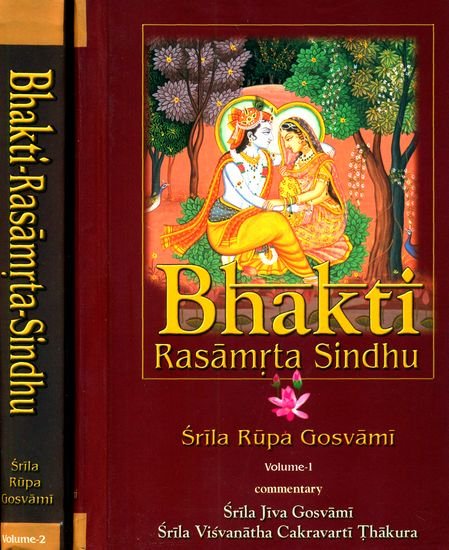Bhakti-rasamrta-sindhu
by Śrīla Rūpa Gosvāmī | 180,912 words
The English translation of the Sri Bhakti-rasamrta-sindhu verse 3.2.70; a medieval era Sanskrit book, written by Rupa Goswami (fl. 15th century) which represents a devotional (bhakti) masterpiece. In this work Goswami describes the nature and different forms of pure love (rasa) as well as various other topics on Vaishnavism and devotion.
Verse 3.2.70
Sanskrit text, Unicode transliteration and English translation:
अथ व्यभिचारिणः —
हर्षो धृतिश् चात्र निर्वेदो’थ विषण्णता ।
दैन्यं चिन्ता स्मृतिः शङ्का मतिर् औत्सुक्य-चापले ॥३.२.६९॥
वितर्कावेग-ह्री-जाड्य-मोहोन्मादावहित्थिकाः ।
बोधः स्वप्नः क्लमो व्याधिर् मृतिश् च व्यभिचारिणः ॥३.२.७०॥atha vyabhicāriṇaḥ —
harṣo dhṛtiś cātra nirvedo’tha viṣaṇṇatā |
dainyaṃ cintā smṛtiḥ śaṅkā matir autsukya-cāpale ||3.2.69||
vitarkāvega-hrī-jāḍya-mohonmādāvahitthikāḥ |
bodhaḥ svapnaḥ klamo vyādhir mṛtiś ca vyabhicāriṇaḥ ||3.2.70||
English translation
Vyābhicārī-bhāvas:
“Twenty-four vyābhicārī-bhavas appear in prīti-rasa:
- self-disgust (nirveda)
- remorse (viṣāda)
- thinking oneself unqualified (dainyam or dīnatā)
- debility (glāni or mlāni)
- apprehension (śaṅka)
- confusion of the mind (āvega)
- insanity (unmāda)
- sickness (vyādhi)
- loss of internal awareness (moha)
- death-like symptoms (mṛti)
- indecision (jāḍyam)
- shame (vrīḍā)
- concealment (avahitthā)
- remembrance (smṛti)
- conjecture (vitarka)
- pondering (cintā)
- finding meaning through scriptural reference (mati)
- steadiness (dhṛti)
- joy (harṣa)
- impatience (autsukhyam)
- indignation (amarṣa)
- insolence (cāpalya)
- dreaming (supti)
- enlightenment (bodha)”
